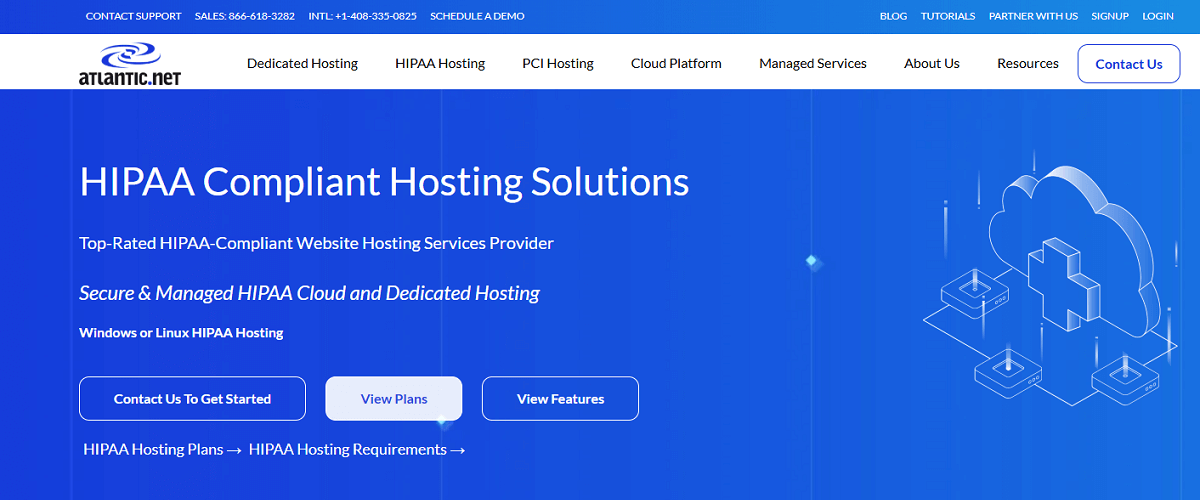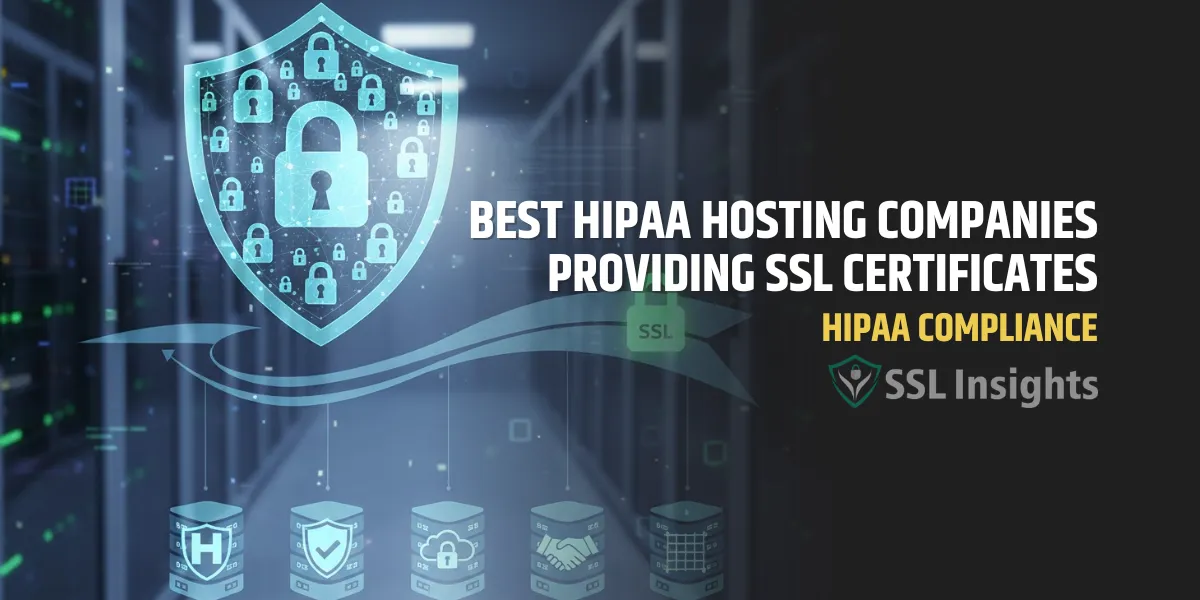Quick Summary
HIPAA-compliant hosting is specialized web hosting that protects healthcare data through encryption, access controls, and security safeguards required by federal law. Top providers for 2026 include Atlantic.Net, HIPAA Vault, and QuickBlox, all offering integrated SSL certificates for secure patient data transmission. Healthcare organizations must verify providers sign Business Associate Agreements (BAAs) and meet technical requirements including data encryption, segregated servers, and 24/7 monitoring. SSL certificates are mandatory for HIPAA compliance, encrypting PHI during transmission and authenticating website identity to prevent data breaches.
This comprehensive guide explores the top HIPAA-compliant hosting providers for 2026, helping you understand essential security requirements and make informed decisions for your healthcare organization.
What is HIPAA-Compliant Hosting and Why Do You Need It?
HIPAA-compliant hosting goes far beyond basic web hosting services. It requires a comprehensive approach to data security that meets strict federal standards for protecting patient information.
Healthcare organizations handling electronic Protected Health Information (ePHI) must use hosting services specifically designed to meet HIPAA requirements. Regular web hosting lacks the security controls, legal agreements, and compliance frameworks necessary to protect sensitive medical data.
What Security Features Does HIPAA-Compliant Hosting Require?
A truly HIPAA-compliant hosting service must include several critical security components:
- Access Controls: Implementing role-based access ensures only authorized personnel can view or modify PHI. This includes unique user identification, automatic logoff features, and emergency access procedures.
- Data Encryption: All PHI must be encrypted both at rest and in transit. This means data stored on servers receives encryption protection, while SSL/TLS certificates secure data traveling between servers and users.
- Operating System Security: Regular security patches, hardened configurations, and continuous monitoring protect against vulnerabilities at the operating system level.
- Segregated Servers: Healthcare data must reside on dedicated, isolated servers separate from non-compliant workloads, preventing unauthorized access and cross-contamination.
How Does HIPAA-Compliant Hosting Protect Patient Health Information?
The primary objective of HIPAA-compliant hosting is helping healthcare organizations store and process PHI within IT environments secured with all necessary physical, technical, and administrative safeguards.
This means providers must implement:
- Physical security measures at data centers (biometric access, surveillance cameras, security personnel)
- Network security protocols including firewalls and intrusion detection systems
- Business Associate Agreements (BAAs) that legally bind the hosting provider to HIPAA compliance
- Audit logging and monitoring to track all access to PHI
- Disaster recovery and backup solutions ensuring data availability during emergencies
- Regular security assessments and vulnerability testing to identify weaknesses
- Incident response procedures for handling potential data breaches
Which Are the Top HIPAA-Compliant Hosting Providers for 2025-2026?
Selecting the right HIPAA-compliant hosting provider requires careful evaluation of features, reliability, and healthcare-specific expertise. Here are the leading providers for 2026:
1. Atlantic.Net – The #1 Choice for Secure & Trusted HIPAA Hosting
Atlantic.Net offers secure, fully compliant HIPAA hosting backed by advanced encryption, 24/7 monitoring, and a proven track record in healthcare data protection. Their infrastructure is built to meet strict regulatory requirements while ensuring high performance and reliability. We recommend Atlantic.Net for organizations that need a trusted, compliant, and scalable hosting environment to safeguard sensitive patient data.

- Dedicated HIPAA-compliant infrastructure with healthcare-focused configurations
- Willingness to sign Business Associate Agreements from day one
- 100% uptime SLA guarantee backed by service credits
- Multiple data center locations across the United States
- 24/7 expert support team with HIPAA compliance knowledge
- Automated backup solutions with configurable retention periods
- Advanced DDoS protection and threat mitigation
Pricing: Plans start at competitive rates with transparent pricing for compliance features.
Ideal For: Healthcare practices of all sizes, medical software developers, telemedicine platforms, and health insurance organizations requiring robust security and reliability.
2. HIPAA Vault – Trusted Leader in Secure & Managed HIPAA Cloud Hosting
HIPAA Vault is a fully managed HIPAA-compliant hosting provider designed for healthcare organizations that need secure, reliable, and scalable cloud infrastructure. It ensures end-to-end protection of ePHI through advanced security measures, continuous monitoring, and compliant data management. With 24/7 expert support and robust uptime, HIPAA Vault helps healthcare businesses confidently meet regulatory standards while focusing on patient care.
Key Features:
- Fully managed HIPAA-compliant cloud hosting
- Continuous monitoring & intrusion detection
- Secure file storage, backups, and disaster recovery
- Encrypted data transmission and storage
- Dedicated 24/7 security & technical support
- Scalable infrastructure optimized for healthcare apps
3. QuickBlox – Top Platform for HIPAA-Ready Messaging, Chat & Telehealth Apps
QuickBlox is a HIPAA-ready communication platform that enables developers to integrate secure chat, video calling, and telehealth solutions into their applications. Built for healthcare, wellness, and enterprise apps, it offers easy API/SDK integration with strong privacy safeguards. With customizable UI and flexible deployment options, QuickBlox helps teams build modern communication tools without compromising security or compliance.
Key Features:
- HIPAA-ready messaging, voice, and video APIs
- Customizable chat UI, SDKs & low-code components
- Encrypted communication and secure data storage
- On-premise, cloud, and hybrid deployment options
- Real-time notifications & user management tools
- Scalable backend designed for telehealth and enterprise apps
How Do Other Leading HIPAA Hosting Providers Compare?
When evaluating HIPAA-compliant hosting options, consider these additional respected providers
- Microsoft Azure for Healthcare: Enterprise-grade cloud infrastructure with extensive compliance certifications, integrated healthcare solutions, and advanced analytics capabilities.
- Amazon Web Services (AWS): Scalable cloud platform with HIPAA-eligible services, comprehensive security tools, and the largest global infrastructure footprint.
- Google Cloud Platform: Advanced security features with healthcare-specific APIs, AI/ML capabilities for medical data analysis, and strong privacy commitments.
- Rackspace: Managed cloud services with deep HIPAA expertise, multi-cloud support options, and personalized consultation services.
Each provider offers unique advantages depending on your organization’s size, technical expertise, budget, and specific healthcare applications.
Why Are SSL Certificates Essential for HIPAA Compliance?
SSL certificates form the foundation of secure healthcare communications, encrypting data transmitted between patients, providers, and healthcare systems.
What Role Do SSL Certificates Play in HIPAA Security?
SSL (Secure Sockets Layer) and its successor TLS (Transport Layer Security) certificates are essential for HIPAA compliance because they:
- Encrypt Data in Transit: SSL certificates create secure, encrypted connections that protect PHI from interception during transmission across networks. Without SSL, patient data travels in plain text, visible to anyone monitoring network traffic.
- Authenticate Identity: Certificates verify that users are connecting to legitimate healthcare websites and portals, preventing phishing attacks and man-in-the-middle exploits that could steal credentials or patient data.
- Build Patient Trust: The padlock icon and “https://” prefix signal to patients that their sensitive health information is protected, increasing confidence in digital healthcare services and patient portal adoption.
- Meet Technical Safeguards: HIPAA’s Security Rule explicitly requires encryption of PHI during transmission, making SSL certificates a mandatory component of compliance rather than an optional security measure.
How Do HIPAA Hosting Providers Implement SSL Solutions?
Leading HIPAA-compliant hosting providers integrate SSL certificates through several approaches:
- Included SSL Certificates: Many providers bundle free SSL certificates (typically Let’s Encrypt or similar) with hosting plans, automatically installing and renewing them without manual intervention.
- Premium SSL Options: For organizations requiring Extended Validation (EV) certificates or wildcard SSL certificates covering multiple subdomains, providers offer premium SSL purchases with higher validation levels.
- Automated Management: The best SSL certificate providers handle certificate installation, configuration, and renewal automatically, eliminating manual technical tasks and preventing expiration-related outages that could expose data.
- Certificate Monitoring: Proactive monitoring ensures certificates remain valid, properly configured, and haven’t been compromised or revoked by certificate authorities.
- Multi-Layer Encryption: Beyond SSL/TLS for transmission, providers implement encryption at rest using AES-256 or similar standards for stored data, creating comprehensive protection.
For healthcare organizations, implementing strong SSL/TLS encryption isn’t optional—it’s a fundamental requirement for protecting patient privacy and maintaining HIPAA compliance.
How Do You Evaluate and Choose a HIPAA Hosting Provider?
Choosing a HIPAA-compliant hosting provider requires thorough due diligence to ensure your healthcare data remains secure and your organization avoids compliance violations.
What Risk Assessment Criteria Should You Consider?
Don’t risk a breach with insecure hosting. When evaluating providers, assess these critical factors:
Business Associate Agreement (BAA): The provider must be willing to sign a BAA, accepting legal responsibility for protecting PHI. Without a signed BAA, the hosting relationship cannot be HIPAA-compliant, regardless of security features.
Security Infrastructure:
- Encryption standards (AES-256 for data at rest, TLS 1.2+ for transmission)
- Firewall configurations and intrusion detection systems
- Physical security measures at data centers
- Network segmentation and isolation protocols
Compliance Certifications:
- HITRUST CSF certification demonstrating healthcare-specific security
- SOC 2 Type II compliance proving operational security controls
- ISO 27001 certification for information security management
- Regular third-party security audits and penetration testing
Backup and Disaster Recovery:
- Automated daily backups with verification testing
- Geographically distributed backup locations preventing regional disasters
- Clear Recovery Time Objectives (RTO) and Recovery Point Objectives (RPO)
- Tested disaster recovery procedures with documented results
Access Controls and Monitoring:
- Multi-factor authentication options for administrative access
- Detailed audit logging tracking all PHI access
- Real-time security monitoring with 24/7 security operations centers
- Alerting for suspicious activities and potential breaches
What Selection Factors Matter Most for Healthcare Organizations?
Beyond basic compliance, consider these practical factors when selecting a HIPAA-compliant hosting provider:
- Technical Support Quality: Healthcare organizations need responsive, knowledgeable support available 24/7/365. Look for providers with healthcare-specific expertise who understand HIPAA requirements and can assist during audits.
- Scalability: Your hosting solution should grow with your practice. Evaluate whether the provider offers easy scaling options without service interruptions, migrations, or compliance recertification.
- Performance and Uptime: Patient care can’t wait for slow websites or system downtime. Choose providers guaranteeing 99.9% or higher uptime with SLAs backing those promises and financial credits for violations.
- Pricing Transparency: Understanding total costs including SSL certificates, backups, compliance features, and support prevents budget surprises. Request detailed pricing breakdowns during evaluation.
- Migration Assistance: Many providers offer free migration services, helping you transition from non-compliant hosting without technical headaches, downtime, or data loss risks.
- Compliance Documentation: Providers should supply documentation proving their compliance measures, making your own HIPAA audits easier and demonstrating due diligence to regulators.
- Geographic Considerations: Data residency requirements may require hosting within specific jurisdictions. Confirm provider data center locations align with your needs and any state-specific regulations.
What Should You Do Next to Secure HIPAA-Compliant Hosting?
Securing HIPAA-compliant hosting with proper SSL certificate integration protects your patients, your practice, and your reputation. The providers outlined in this guide offer proven solutions for healthcare organizations of all sizes.
How Do You Identify Your Specific Hosting Requirements?
Start by identifying your specific needs:
- Data Volume: Current and projected storage requirements for patient records, imaging, and backups
- Application Support: Required compatibility with EHR systems, telemedicine platforms, patient portals, and billing software
- Budget Constraints: Available budget for hosting, including setup, monthly fees, and compliance features
- Technical Expertise: Internal IT capabilities determining managed vs. unmanaged hosting needs
- Compliance Requirements: Specific regulations beyond HIPAA (HITECH, state privacy laws, international standards)
What Steps Should You Take to Select the Right Provider?
Then, follow this selection process:
- Shortlist 2-3 Providers: Based on your requirements, identify providers matching your criteria
- Request Detailed Proposals: Ask for comprehensive pricing, feature lists, and compliance documentation
- Verify Healthcare Experience: Inquire about their healthcare client base and years serving medical organizations
- Review BAA Terms: Examine Business Associate Agreement terms before committing
- Test Support Quality: Contact support with technical questions to assess responsiveness and knowledge
- Check References: Request references from similar healthcare organizations
- Start with Trial Period: If available, begin with a trial or pilot project before full migration
Final Thoughts
Selecting a HIPAA compliant hosting provider with robust SSL certificates is essential for protecting sensitive healthcare data in 2026. The companies reviewed offer comprehensive security features, Business Associate Agreements, and encryption standards necessary for regulatory compliance. Evaluate your specific needs, budget, and scalability requirements before choosing a provider. Prioritize hosts with proven track records in healthcare data protection to ensure patient privacy and avoid costly penalties.
Frequently Asked Questions (FAQs)
What makes a hosting provider HIPAA compliant?
HIPAA compliant hosting providers must offer data encryption, secure backup systems, access controls, and signed Business Associate Agreements (BAA). The providers need physical, technical, and administrative safeguards to protect patient health information.
Do HIPAA compliant websites need SSL certificates?
SSL certificates are mandatory for HIPAA compliance. These certificates encrypt data transmission between servers and browsers. Healthcare websites must use TLS 1.2 or higher encryption standards to protect patient information.
What is the cost of HIPAA compliant hosting?
HIPAA compliant hosting costs range from $200 to $1,500 per month. The price varies based on storage space, security features, and support level. Additional costs apply for SSL certificates and backup services.
Can Amazon AWS be used for HIPAA compliance?
AWS offers HIPAA eligible services. Users must sign a BAA with Amazon. AWS provides encryption, access logging, and backup features. Organizations must configure these services correctly to maintain compliance.
What happens if a hosting provider is not HIPAA compliant?
Non-compliance results in fines from $100 to $50,000 per violation. Healthcare organizations face legal penalties. Patient data breaches can lead to criminal charges and license revocation.
How often should SSL certificates be renewed for HIPAA compliance?
SSL certificates require annual renewal. Organizations must monitor expiration dates. Certificate updates ensure continuous data protection. Automated renewal systems prevent security gaps.
Which hosting providers offer HIPAA compliance guarantees?
Atlantic.Net, HIPAA Vault, and QuickBlox provide HIPAA compliance guarantees. These companies offer signed BAAs. Their services include managed security, backup systems, and disaster recovery.
Does Google Cloud Platform support HIPAA compliance?
Google Cloud Platform supports HIPAA compliance. Users must complete a BAA. The platform offers encryption tools, audit logging, and access controls. Organizations maintain responsibility for proper configuration.

Priya Mervana
 Verified Web Security Experts
Verified Web Security Experts
Priya Mervana is working at SSLInsights.com as a web security expert with over 10 years of experience writing about encryption, SSL certificates, and online privacy. She aims to make complex security topics easily understandable for everyday internet users.



